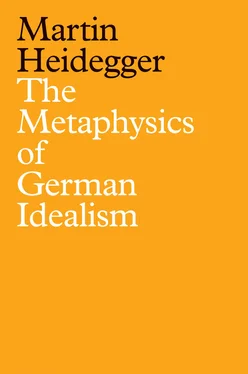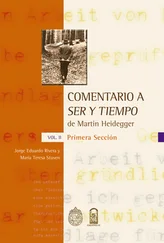This English translation © Polity Press, 2021
Polity Press
65 Bridge Street
Cambridge CB2 1UR, UK
Polity Press
101 Station Landing
Suite 300
Medford, MA 02155, USA
All rights reserved. Except for the quotation of short passages for the purpose of criticism and review, no part of this publication may be reproduced, stored in a retrieval system or transmitted, in any form or by any means, electronic, mechanical, photocopying, recording or otherwise, without the prior permission of the publisher.
ISBN-13: 978-1-5095-4012-9
A catalogue record for this book is available from the British Library.
Library of Congress Cataloging-in-Publication Data
Names: Heidegger, Martin, 1889–1976, author. | Moore, Ian Alexander, translator. | Therezo, Rodrigo, translator. | Heidegger, Martin, 1889–1976. Metaphysik des deutschen Idealismus.
Title: The metaphysics of German idealism : a new interpretation of Schelling’s Philosophical investigations into the essence of human freedom and the matters connected therewith (1809) / Martin Heidegger ; translated by Ian Alexander Moore and Rodrigo Therezo.
Other titles: Metaphysik des deutschen Idealismus. English
Description: Cambridge ; Medford : Polity Press, [2021] | Includes bibliographical references. | Summary: “A major work by one of the most influential philosophers of the 20th century, published here in English for the first time” – Provided by publisher.
Identifiers: LCCN 2020057294 (print) | LCCN 2020057295 (ebook) | ISBN 9781509540105 (hardback) | ISBN 9781509540129 (epub)
Subjects: LCSH: Schelling, Friedrich Wilhelm Joseph von, 1775–1854. | Schelling, Friedrich Wilhelm Joseph von, 1775–1854. Philosophische Untersuchungen über das Wesen der menschlichen Freiheit. | Idealism, German.
Classification: LCC B2898 .H4513 2021 (print) | LCC B2898 (ebook) | DDC 193–dc23
LC record available at https://lccn.loc.gov/2020057294LC ebook record available at https://lccn.loc.gov/2020057295
The publisher has used its best endeavors to ensure that the URLs for external websites referred to in this book are correct and active at the time of going to press. However, the publisher has no responsibility for the websites and can make no guarantee that a site will remain live or that the content is or will remain appropriate.
Every effort has been made to trace all copyright holders, but if any have been overlooked the publisher will be pleased to include any necessary credits in any subsequent reprint or edition.
For further information on Polity, visit our website: politybooks.com
Translators’ Introduction
The decision to translate Heidegger into English is in many respects a difficult one. Not simply because Heidegger’s thought remains irreducibly tied to language and to a certain artisanal craft of writing – a “ Hand-werk der Schrift ,” as he calls it in “The Letter on ‘Humanism’” 1– but also because English, to all appearances, at least, was not a language Heidegger particularly esteemed. This would be philosophically irrelevant were it not for the utmost significance Heidegger himself ascribes to “the essential danger” that the “English-American” language poses, a threat to nothing less than the “shrine” of being in which “the essence of the human is held in store.” 2It is difficult to overlook, then, a certain irony at the heart of any English translation of Heidegger, particularly of a Heidegger text, such as The Metaphysics of German Idealism , dating back to the early 1940s, when Heidegger’s most explicit condemnation of English takes place. Would it not be an ontological disaster to translate the thinker of this ontological disaster precisely into the language in which this disaster is supposed to unfold?
Yet we maintain that such an undertaking is nevertheless in keeping with another Heidegger, more open to a non-Greek other and capable of writing – in 1946 – that “in the most diverse ways, being speaks everywhere and always, through all language,” even, dare we say, the English language? 3
Translated here in its entirety for the first time is volume forty-nine of Heidegger’s Gesamtausgabe or “Collected Works,” a volume comprised of a lecture course delivered at the University of Freiburg in the first trimester of 1941 and of material for a seminar held there in the summer semester of that year. Previously, excerpts from this volume, occasionally revised, had appeared in the appendix to Heidegger’s first lecture course on Schelling from 1936, whose 1971 publication (English 1985) was overseen by Heidegger himself. 4As indicated by the title of the present volume, here Heidegger again takes up Schelling’s 1809 treatise on freedom, which, he argues, marks the peak of German Idealism. Only, this time, Heidegger more explicitly distinguishes his own thought from that of his German predecessor, whose work he situates within the continuum of Western metaphysics. Along the way, taking up Schelling’s important distinction between ground and existence, Heidegger provides an extensive history of the concepts of existence and ground, with detailed discussions of Jaspers, Kierkegaard, Hegel, and his own opus magnum Being and Time – including its unpublished third division.
The style of the present volume is uneven. Some of the material appears as fully worked-out prose. Other portions resemble notes. We have endeavored to remain faithful to the character of the text, at the expense of occasional inelegance or grammatical incompleteness.
The reader can consult the glossaries to see how we have typically rendered Heidegger’s terminology, but there are four sets of terms which we believe it will prove helpful to discuss in advance.
1. We have rendered the noun das Sein as “being” and the nominalized present participle das Seiende as “beings,” “the being,” or “that which is.” When it is unclear in the English which is meant, as in the phrases “the being { Sein } that human Dasein itself is” and “the proper being { Seiende } in itself,” we have, as here, inserted the German. Heidegger’s use of the archaic German spelling Seyn has been translated by the obsolete English beyng . Since, in Schelling’s time, Seyn , with a “y,” was standard, we have used “being” when translating authors from that period, although here too we have included the German. The abstract Seiendheit appears as “beingness.” Although, in Schelling’s later philosophy, which Heidegger occasionally references, Schelling does not use Sein and Seiendes in the same way Heidegger does, we thought it important to maintain terminological consistency. In cases where confusion might result, we have interpolated the German.
2. Heidegger uses numerous words for existence and for the human being in particular. In order to keep them apart, we have, with two exceptions, consistently rendered Existenz as “existence,” Ex-sistenz as “ex-sistence,” existenzial as “existential,” existenziell as “existentiell,” Mensch as “human,” and Menschsein as “the being of the human,” “human being” (no article), or, in one instance, “being-human.” (In two cases, in which we include the German, it seemed more appropriate to translate das Existenzielle in Schelling as “the existential.”) Unless indicated by a German interpolation, we have, as in point 1, left Dasein and Da-sein in the original. In § 11, θ, Heidegger claims this term is “ untranslatable ,” although he does provide – translating from within German, as it were – an explanation as to how one should understand it, which we reproduce here:
Читать дальше












